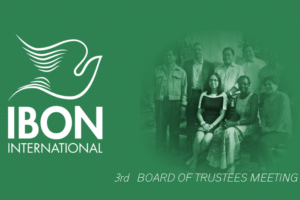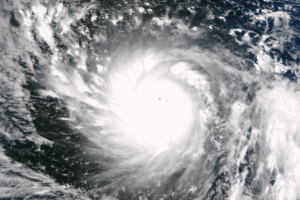Sign-on to our statement here: https://bit.ly/2OEcy0t
A civil society statement on the 25th Conference of Parties (COP25)
We are movements and civil society organizations working with and representing communities and peoples at the frontlines of the climate emergency. We stand at the forefront of the struggle for land, safe, secure, and decent work, social services for all, and human rights. We are reclaiming and defending our dignity and future threatened by governments and big corporate interests that do not have any regard for our rights and the planet.
The 25th Conference of Parties (COP25) is being held in Madrid, Spain as Chile under the government of Sebastian Piñera decided to push on with its atrocious war against human rights and democracy rather than heed the Chilean peoples’ demand for demilitarization of the country prior to the hosting of the multilateral meeting. We stand in solidarity with the Chilean masses who continue to wage a just fight against multinational interests engaged in the exploitation of Chile’s land, water, and other natural resources.
We also unite in spirit with millions of peoples who are out in the streets in different parts of the world – from Hong Kong, Lebanon, Brazil, Bolivia, Ecuador, Peru, Colombia, Haiti, and the Philippines, demanding economic and social justice that is fundamentally linked to climate justice.
At the heart of the climate crisis is a faltering economic system driven by capital accumulation where the imperatives of profit take precedence over all other needs and values. Indeed, despite massive evidence that expanded production and resource extraction is killing the entire planet, governments and corporations keep heaping coal for the runaway growth train.
While developed countries and their corporations continue to reap profits at the expense of the planet’s ecological limits, underdeveloped and developing countries disproportionately bear the unprecedented impacts of climate change. It is increasing occupational hazards, wiping out livelihoods, displacing communities, increasing debt, stoking situations of conflict and violence, and denying developing and poor countries the opportunity to lift their people out of poverty. In all these, women, the elderly, children, rural, and indigenous peoples of the global South are the most vulnerable.
Despite the gravity of the climate crisis and the millions of lives at stake, developed country governments refuse to honor their climate debt. The Paris Agreement is at risk of falling apart as the US, the country that bears the most responsibility for climate change, threatens to withdraw from the only existing climate treaty. Efforts of a few countries to meet their commitments are compromised as other large economies roll back key climate change policies.
We remain vigilant over the agenda being negotiated at the COP25 process, and refuse the corporate capture of the climate agenda. Civil society and peoples’ movements have long made known their positions on the host of issues to be tackled in Madrid. In this light, we reiterate the following demands:
Developed countries must recognize and honor their greater historical responsibility in the climate crisis. Such recognition should translate more ambitious action to phase out fossil fuels and increase domestic and global targets to limit warming to 1.5 degrees Celsius in accordance with science and principle of equity
We demand that developed countries pay for their climate debt to developing countries by providing adequate, predictable, and additional finance for climate adaptation, mitigation, reparation for irreversible losses and damages suffered by communities in the global South because of climate change, and just transition in developing countries. Global public climate finance should be distinguished from existing official development assistance (ODA) flows and must focus on the most vulnerable, not only in reference to countries, but also local communities including indigenous peoples, farming communities, coastal communities, urban slums, fisher folk, rural women, children, and other marginalized groups in society
We are against false solutions such as carbon offsets and geo-engineering and Bioenergy with Carbon Capture and Storage that only provide a lifeline to the fossil fuel industry and delay urgent domestic changes that need to take place in rich industrial countries. We oppose mechanisms which trade in carbon credits obtained from dubious projects that violate the rights of communities, especially of women and indigenous peoples
Developing and least developed country governments must ensure strong positions and the highest political commitment at the climate negotiation table, keeping in mind the demands and priorities of their constituents who are most affected of the mounting impacts of climate change. We call for strong solidarity with the vulnerable communities and underscore the need to support their struggles
In the face of climate violence and government denial, grassroots communities are organizing and mobilizing themselves to enhance their resiliency and curb emissions, and to promote the equitable and democratic access to productive resources and care of the commons. People-powered climate actions such as collective land cultivation and occupation, agro-ecological farming, community-led relief and rehabilitation drives are being organized across the global South in the context of their struggle against fossil fuel and extractive companies, encroachment on land, water, and other resources by multinational corporations, and disaster capitalism. These oases of alternative development models and practices prove the vitality of social movements and collective action from the ground in the struggle for climate justice.
And yet, these initiatives are not only unsupported but are undermined. Rights and environmental defenders in the Philippines, Colombia, India, and Brazil are threatened, attacked, or killed for protecting their land, waters, forests, and communities from large corporations, paramilitary groups and their own governments. Majority of the defenders are indigenous peoples who have been pushed over decades or centuries to the fringes of society.
Time and again, history has shown how peoples’ sovereign collective action has rescued humanity from acute economic and political crises. In the past months, we have participated in mass actions and strikes that helped bring the peoples’ demand for climate justice once more into the center of public discourse.
We believe that sustained mobilization of peoples across wide sectors is also key to addressing the climate crisis, not only by achieving just outcomes at the climate negotiation process, but more fundamentally, by establishing a society based, not on the pursuit of profit, but on the wellbeing of the people and planet. ###
Initial signatories:
IBON International
All-Nepal Peasants Federation (Nepal)
ARCADE (Senegal)
Instituto Politécnico Tomás Katari (Bolivia)
INDIES (Indonesia)
Serikat Perempuan Indonesia (Indonesia)
National Women Peasants Association (Nepal)
Nepal Agriculture Labour Association (Nepal)
South Asia Peasants Coalition – Kathmandu Secretariat (Nepal)
National Alliance of Right to Food Network (Nepal)
Food Sovereignty and Climate Justice Forum (Nepal)




